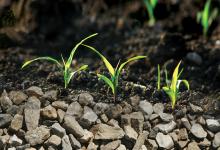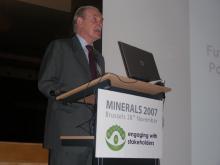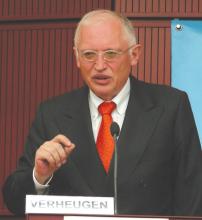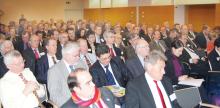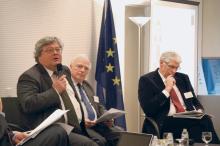
The European Minerals Forum in November last year encouraged delegates to look at the positive opportunities presented by recession
The European aggregates industry has suffered heavily during the current recession, reporting an average decline of about 20-25% in 2009 compared to 2008, according to the
More than 100 delegates gathered at the event where a range of speakers presented their 'creative thinking' on improving health and safety, the environment and productivity as well as stimulating sustainable development. The event started with a key note speech from UEPG president Jim O'Brien which set the tone for the rest of the event.
'Ensuring Access to Essential Raw Materials' was the theme of the European Minerals Forum 2008 and the subject was also discussed at the 2009 edition. According to the UEPG, despite continuous dialogue with the EU Institutions, it is still a key issue for the industry.
Maria Spiliopoulou-Kaparia from the
As a top priority for the sector, maintaining the health, safety and quality of life of all stakeholders ensures a long-term vision of our industry and is a return on investment. Brenda O'Brien who is Brussels liaison officer for the European Agency for Health and Safety at Work (OSHA), introduced the work of the agency and explained the high cost of poor maintenance.
'Stimulating Investment in Sustainable Infrastructures' was the subject of the third challenge presented to delegates. Helmut Morsi, International Transport Relations &
Eurovia director for
The fourth session targeted meeting the energy and resource efficiency challenge. In this segment Gunther Wolff from Sustainable Production and Consumption, DG Environment, presented the EU framework for sustainable construction and especially advocated recycling. He underlined the fact that construction activities underpin most other activities in society: economic, social, environmental, safety and health.
Mike Gilbert of
After the presentation by the keynote speakers, participants met in break-out sessions in order to follow up the issues raised by the Commission and each subject. The sessions were organised with a business leader to chair, a guest speaker to outline the challenge and a leading business representative to act as rapporteur to ensure deliverable outcomes. The discussions successfully led to recommendations for the high-level stakeholders of the industry.
This year, the European Platform for Recycled Aggregates (EPRA) co-organised the fifth break-out session of which the theme was 'Practically Stimulating Recycling of Construction and Demolition Waste'. The final session was a new initiative which targeted at promoting recycling in a transversal approach. This new initiative came at a time when recycling has been a focus of discussion in the Commission.
The
The next European Minerals Forum will take place on 24 November 2010 in Brussels.

